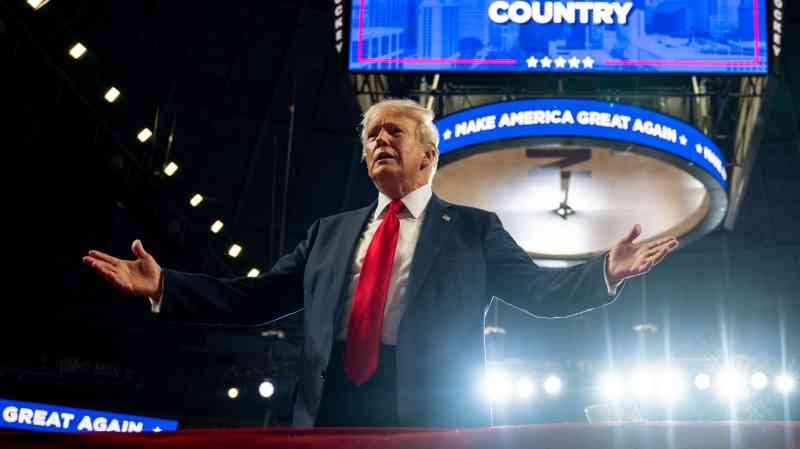Donald Trump has made a surprise attack on the independence of the US Federal Reserve, saying that the president should have a say over the central bank’s decisions.
Speaking at his Mar-a-Lago residence in Florida, the Republican presidential candidate said: “I feel the president should have at least [a] say in there.
“I think that in my case, I made a lot of money, I was very successful and I think I have a better instinct than, in many cases, people that would be on the Federal Reserve or the chairman.”
After a turbulent week in global stocks markets, partly caused by disappointing US jobs data that led to calls for an immediate cut in interest rates, there was better news on the economy yesterday. Weekly claims for unemployment benefits in the US have eased by the most encouraging margin in almost a year, calming fears about the health of the world’s largest economy.
The number of Americans filing new applications for state unemployment benefits fell by 17,000 to 233,000 for the week to August 3, the Labor Department said. Economists had expected 240,000 claims for the latest week. Weekly unemployment claims are widely considered to represent job losses.
The figures were watched closely by investors after disappointing jobs data for July, published last Friday, fuelled a stock market sell-off on Monday amid fears that the US economy might be edging towards a recession. Stocks on Wall Street opened higher, therefore, as investors welcomed the latest numbers, which were better than expected.
The technology-heavy Nasdaq Composite share index was 3 per cent higher at 16,686.62 in early afternoon trading in New York, while the more broadly based S&P 500 was up 2.4 per cent at 5,325.77. Benchmark treasury yields rose back above 4 per cent and the US dollar strengthened against a basket of currencies.

Jamie Dimon, the chief executive of JP Morgan, the Wall Street bank, suggested that the stock market sell-off at the start of the week had been an overreaction. In an interview with CNBC on Wednesday, he said: “Markets fluctuate. I think people overreact a little bit to the daily fluctuation of the market. And sometimes it’s for good reasons. Sometimes it’s virtually [for] no reason.
“I was with Warren Buffett [the renowned investor] yesterday, and we always talk about the resiliency of America. It is extraordinary.”
Investors in interest rate futures contracts lowered their bets that the US Federal Reserve would start to cut borrowing costs next month with a 50-basis-point reduction to about a 58 per cent probability, from 70 per cent before the release.
“The talk of an imminent recession seems wide of the mark,” Marc Chandler, chief market strategist at Bannockburn Global Forex, said.
“Investors have to be careful not to read too much into one report, like they did recently with the last payroll report,” Jeffrey Roach, chief economist at LPL Financial, said. “If the data deteriorates quickly from here, the Fed could take more decisive action in September and cut by a half of a per cent.”
Last week the Fed kept its benchmark overnight interest rate in the 5.25 per cent to 5.50 per cent range, where it has been since last July. However, Jerome Powell, chairman of the central bank, said that a reduction in borrowing costs would be on the table at the next policy meeting in September.
Jobless claims have been rising on average since June, with part of the rise blamed on volatility related to motor vehicle plant shutdowns for retooling and disruptions caused by Hurricane Beryl in Texas.
The government’s monthly non-farm payrolls report last Friday showed job gains had slowed markedly in July and that the unemployment rate had risen to 4.3 per cent, its highest point since October 2021, when the economy was still recovering from the pandemic recession.
Commenting on the latest jobs market data, Nick Bunker, economic research director for North America at the Indeed Hiring Lab, said: “It’s not in freefall. It’s just continuing the moderation that we’ve been seeing.”
